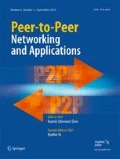Abstract
In volunteer computing networks, the peers contribute to the solution of a computationally intensive problem by freely providing their computational resources, i.e., without seeking any immediate financial benefit. In such networks, although the peers can set certain bounds on how much their resources can be exploited by the network, the monetary cost that the network brings to the peers is unclear. In this work, we propose a volunteer computing network where the peers can set monetary budgets, limiting the financial burden incurred on them due the usage of their computational resources. Under the assumption that the price of the electricity consumed by the peers has temporal variation, we show that our approach leads to an interesting task allocation problem, where the goal is to maximize the amount of work done by the peers without violating the monetary budget constraints set by them. We propose various heuristics as solution to the problem, which is NP-hard. Our extensive simulations using realistic data traces and real-life electricity prices demonstrate that the proposed techniques considerably increase the amount of useful work done by the peers, compared to a baseline technique.







Similar content being viewed by others
Notes
SETI@Home, http://setiathome.berkeley.edu/index.php.
Folding@Home, http://folding.stanford.edu/.
ClimatePrediction, http://climateprediction.net/.
ABC@Home, http://abcathome.com/.
In the rest of the paper, we refer to the central authority as the dispatcher.
In our work, we assume that the budgets are set on a weekly basis. Some of the solutions presented in Section 3 will be based on this assumption.
We assume that each peer has a single CPU with varying clock frequencies.
Charity Engine, http://www.charityengine.com/.
Clouds and Peer-to-Peer, http://berkeleyclouds.blogspot.com/2009/06/clouds-and-peer-to-peer.html.
References
Anderson D (2011) Emulating volunteer computing scheduling policies. In: Proceedings of the IEEE international symposium on parallel and distributed processing workshops and PhD Forum, pp 1839–1846
Anderson DP (2007) Local scheduling for volunteer computing. In: Proceedings of the IEEE international symposium on parallel and distributed processing, pp 1–8
Babaioff M, Immorlica N, Kempe D, Kleinberg R (2007) A knapsack secretary problem with applications. In: Approximation, randomization, and combinatorial optimization. Algorithms and techniques, pp 16–28
Babaoglu O, Jelasity M, Kermarrec A, Montresor A, Van Steen M (2006) Managing clouds: a case for a fresh look at large unreliable dynamic networks. In: Operating systems review, pp 9–13
Babaoglu O, Marzolla M, Tamburini M (2011) Design and implementation of a P2P cloud system. Tech. Rep. UBLCS-2011-10, Department of Computer Science. University of Bologna
Barroso LA, Hölzle U (2009) The datacenter as a computer: an introduction to the design of warehouse-scale machines, 1st edn. Morgan and Claypool Publishers
Bhagwan R, Savage S, Voelker GM (2003) Understanding availability. In: Proceedings of the 2nd international workshop on peer-to-peer systems, pp 256–267
Böckenhauer HJ, Komm D, Královič R, Rossmanith P (2012) On the advice complexity of the knapsack problem. In: Proceedings of the 10th Latin American international conference on theoretical informatics, pp 61–72
Costa F, Silva L, Dahlin M (2011) Volunteer cloud computing: Map Reduce over the internet. In: IEEE international symposium on parallel and distributed processing workshops and Phd Forum, pp 1855–1862
Cunsolo V, Distefano S, Puliafito A, Scarpa M (2009) Cloud@home: bridging the gap between volunteer and cloud computing. In: Emerging intelligent computing technology and applications, pp 423–432
Cunsolo VD, Distefano S, Puliafito A, Scarpa M (2009) Volunteer computing and desktop cloud: The cloud@home paradigm. In: Proceedings of the 8th IEEE international symposium on network computing and applications, pp 134–139
Estrada T, Flores DA, Taufer M, Teller PJ, Kerstens A, Anderson DP (2006) The effectiveness of threshold-based scheduling policies in BOINC projects. In: Proceedings of the 2nd IEEE international conference on e-science and grid computing, p 88
Lombraña González D, Grey F, Blomer J, Buncic P, Harutyunyan A, Marquina M, Segal B, Skands P, Karneyeu A (2012) Virtual machines and volunteer computing: Experience from lhc@home: Test4theory project. In: The international symposium on grids and clouds, pp 36–49
Himyr N, Blomer J, Buncic P, Giovannozzi M, Gonzalez A, Harutyunyan A, Jones PL, Karneyeu A, Marquina MA, Mcintosh E, Segal B, Skands P, Grey F, Gonzlez DL, Zacharov I (2012) BOINC service for volunteer cloud computing. J Phys Conf Ser 396 (3)
Kayaaslan E, Cambazoglu BB, Blanco R, Junqueira FP, Aykanat C (2011) Energy-price-driven query processing in multi-center web search engines. In: Proceedings of the 34th international ACM SIGIR conference on research and development in information retrieval, pp 983–992
Kondo D, Anderson DP, Vii JM (2007) Performance evaluation of scheduling policies for volunteer computing. In: Proceedings of the 3rd IEEE international conference on e-Science and grid computing, pp 415–422
Kondo D, Javadi B, Malecot P, Cappello F, Anderson D (2009) Cost-benefit analysis of cloud computing versus desktop grids. In: IEEE international symposium on parallel distributed processing, pp 1–12
Le K, Bianchini R, Martonosi M, Nguyen TD (2009) Cost- and energy-aware load distribution across data centers. In: Workshop on power aware computing and systems
León X, Navarro L (2011) Limits of energy saving for the allocation of data center resources to networked applications. In: Proceedings of the 30th ieee international conference on computer communications, pp 216–220
Marchetti-Spaccamela A, Vercellis C (1995) Stochastic on-line knapsack problems. Math Program 68(1–3):73–104
Panzieri F, Babaoglu O, Ghini V, Ferretti S, Marzolla M (2011) Distributed computing in the 21st century: some aspects of cloud computing. Tech. Rep. UBLCS-2011-03, Department of Computer Science. University of Bologna
Qureshi A, Weber R, Balakrishnan H, Guttag J, Maggs B (2009) Cutting the electric bill for Internet-scale systems. In: Proceedings of the ACM SIGCOMM conference on data communication, pp 123–134
Rao L, Liu X, Xie L, Liu W (2010) Minimizing electricity cost: optimization of distributed Internet data centers in a multi-electricity-market environment. In: Proceedings of the 29th IEEE international conference on computer communications, pp 1145–1153
Ren S, He Y, Xu F (2012) Provably-efficient job scheduling for energy and fairness in geographically distributed data centers. In: The 32nd international conference on distributed computing systems
Rood B, Lewis M (2007) Multi-state grid resource availability characterization. In: 8th IEEE/ACM international conference on grid computing, pp 42–49
Shah AJ, Krishnan N (2008) Optimization of global data center thermal management workload for minimal environmental and economic burden. IEEE Trans Components Packag Technol39–45
Taufer M, Kerstens A, Estrada TP, Flores DA, Zamudio R, Teller PJ, Armen R, Brooks CL (2007) Moving volunteer computing towards knowledge-constructed, dynamically-adaptive modeling and scheduling. Int Parallel Distrib Process Symp 478
Valancius V, Laoutaris N, Massoulié L, Diot C, Rodriguez P (2009) Greening the Internet with nano data centers. In: Proceedings of the 5th international conference on emerging networking experiments and technologies, pp 37–48
Wang Z, Tolia N, Bash C (2010) Opportunities and challenges to unify workload, power, and cooling management in data centers. In: Proceedings of the 5th international workshop on feedback control implementation and design in computing systems and networks, pp 1–6
Zhang J, Phillips C (2011) Job scheduling via resource availability prediction for volunteer computational grids. Int J Grid Util Comput 2(1):25–32
Zhou Y, Chakrabarty D, Lukose R (2008) Budget constrained bidding in keyword auctions and online knapsack problems. In: Proceedings of the 17th international conference on world wide web, pp 1243–1244
Zhou Y, Naroditskiy V (2008) Algorithm for stochastic multiple-choice knapsack problem and application to keywords bidding. In: Proceedings of the 17th international conference on world wide web, pp 1175–1176
Acknowledgment
This work was partially supported by the COST (European Cooperation in Science and Technology) framework, under Action IC0804: Energy efficiency in large scale distributed systems, and by TUBITAK (The Scientific and Technical Research Council of Turkey) under Grant 109M761. An early version of this work was presented as a poster in W-PIN+NetECON 2013: The joint workshop on Pricing and Incentives in Networks and Systems in conjunction with ACM SIGMETRICS 2013.
Author information
Authors and Affiliations
Corresponding author
Rights and permissions
About this article
Cite this article
Guler, H., Cambazoglu, B.B. & Ozkasap, O. Task allocation in volunteer computing networks under monetary budget constraints. Peer-to-Peer Netw. Appl. 8, 938–951 (2015). https://doi.org/10.1007/s12083-014-0301-3
Received:
Accepted:
Published:
Issue Date:
DOI: https://doi.org/10.1007/s12083-014-0301-3




